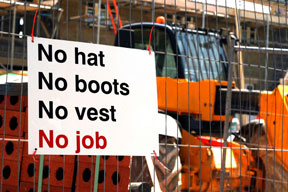 Broadly speaking, industrial fasteners can be characterized as any kind of small mechanical device used to hold together the parts that make up machine tools or the manufactured products that are made by them. This includes but is not limited to nuts, bolts, clips, springs, hinges, Abbotts Construction pins, rivets, stainless steel fasteners, and washers. The most common, or main types of industrial fasteners will often be made of a durable metal such as steel. Non-metallic fasteners are usually plastic or rubber, and sometimes other materials such as fibreglass or ceramics.
Broadly speaking, industrial fasteners can be characterized as any kind of small mechanical device used to hold together the parts that make up machine tools or the manufactured products that are made by them. This includes but is not limited to nuts, bolts, clips, springs, hinges, Abbotts Construction pins, rivets, stainless steel fasteners, and washers. The most common, or main types of industrial fasteners will often be made of a durable metal such as steel. Non-metallic fasteners are usually plastic or rubber, and sometimes other materials such as fibreglass or ceramics.
The basic concept of modern manufacturing relies upon the inter-changeability of parts. Having interchangeable parts makes possible the assembly line process that sparked the original industrial revolution. Having interchangeable parts means maintaining standards on how such parts are designed and how they fit together. Machine screws and bolts for example are threaded fasteners used to hold together a vast array of things including most of the consumer goods you own, along with the machine tools used to manufacture them, and even the trucks used to deliver them. The outside threads of a machine screw and the inside threads of the nut that fits them should be manufactured according to strict international standards, so that a screw manufactured in the Far East will perfectly fit a nut manufactured in North America. The world body which established these standards and oversees compliance is the ISO or “International Organization for Standardization”.
Aside from nuts and bolts, the other main types of industrial fasteners include rivets which are a more permanent type of fastening device (they must be drilled out to be changed), compression fittings, which are complex, multi-part fasteners that join together the ends of pipes and hoses, clips, which work in various ways — usually employing friction and tension as with springs, and finally, washers. By themselves, Electrician Job Description Uk washers are not actually fasteners. Instead of holding parts together, they facilitate the effectiveness of other fasteners like nuts and bolts. Washers can be used to make sure the head of a bolt does not get pulled through the hole of the parts being joined together. Special variations of washers such as “lock washers” are often used to prevent two joined parts from vibrating loose over time.
By far, the most common type of industrial fastener is some form of threaded rod tapered at one end until it comes to a sharp point. Known as screws, these mostly stainless steel fasteners are actually an inclined plane wound around a cylinder. They are useful for shutting off the flow of water inside a valve, or increasing and decreasing the air pressure inside pneumatic tool systems. The versatile screw is used to join together almost every man-made object that we come in contact with.
Construction
